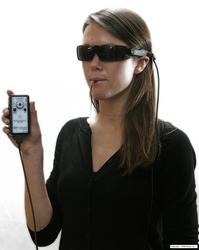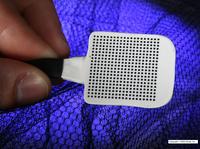Introducing another guest post from our intern Bo Zhang! Read more of Bo's work at Free Radicals, from Boston University's Center for Science and Medical Journalism. Now, here's Bo:

With densely packed tactile nerve endings, the tongue seems the ideal organ for the task. A device which uses the tongue to stimulate the blind person's visual cortex and let him/her identify light and shapes was developed by neuroscientists from Wicab, Inc. Called BrainPort, the device consists of a lollipop-like electrode array worn on the tongue, a miniature camera mounted on a pair of sunglasses, and a hand-held controller about the size of a cell phone. It works by converting images taken from the camera to electrical impulses that can be felt by the blind person's tongue, and then the signals go from the tongue to the brain.

It's a little bit like Braille, in which bumps felt by fingers are translated into words that the brain can "read." BrainPort allows electricity on the tongue to be interpreted as images by the brain. This technology is called sensory substitution.
The BrainPort is especially good at helping blind people navigate in a real environment. The guy in the video below even does rock climbing with it - how awesome is that?
The best thing about the BrainPort is that it's noninvasive, unlike an implant. The device will be ready for sale by the end of this year.
Images courtesy of Wicab, Inc.




June 14, 2010 1:55 AM
Can someone please spell the word "Tongue" correctly in the title of this piece? The letter "u" is misplaced. Thanks!
June 14, 2010 9:31 AM
Thanks for catching that. It's fixed now.
July 29, 2010 11:33 AM
When the brain suffers a stroke, often the unaffected areas of the brain will attempt to adapt to carry out the specialized functions specific to the area of that particular damaged tissue.
Why not reach out to employ different ORGANS to accomodate where eyes or other organs are not functional? Makes sense to me (no pun intended). Is it true that many people with blindness have a more acute sense of hearing? As well as other senses?
Looking forward to 'see' where this neurological technology will go.